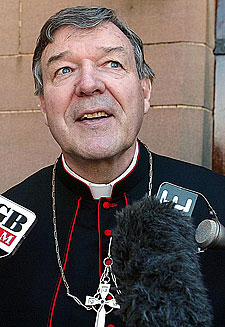 Last month the NSW Greens moved to send comments of Cardinal George Pell on stem cell research to the Upper House Privileges Committee. Greens' spokesperson Lee Rhiannon said that Dr Pell brought MPs religious life into the debate, that some people saw it as a threat, so Greens believe the matter needed investigation.
Last month the NSW Greens moved to send comments of Cardinal George Pell on stem cell research to the Upper House Privileges Committee. Greens' spokesperson Lee Rhiannon said that Dr Pell brought MPs religious life into the debate, that some people saw it as a threat, so Greens believe the matter needed investigation.
The Cardinal's comments were made prior to the Lower House debating the Bill that would allow stem cell research on embryos, previously outlawed in this State.
Cardinal Pell said the Greens' investigative move "had a whiff of Stalinism" and it was a clumsy attempt to curb a citizen's right of free speech. He was supported by the Council for Civil Liberties spokesman who said the Greens' move was "absurd'.
Dr Pell's comments on embryo stem cell research echoed the Pope on a recent visit to Mexico, and the Scottish Cardinal. The latter two told Catholic MPs they must vote "No' to abortion rights law. Dr Pell was echoing many contemporary Roman Catholic colleagues as they oppose liberalising secularism.
The deep pity about Dr Pell's comments was that the resulting furore of media comment diverted arguments for and against the proposed NSW stem cell research law to whether a Church spokesman had the right "to tell MPs how to vote'.
Where Protestant Christians, including Sydney Anglicans, would disagree with Cardinal Pell is his view that Roman Catholic MPS are obligated to follow the teaching of their Church when voting. He later told the ABC that he was saying that as a Catholic, if you violate Catholic moral principles, it has consequences for your relationship with God and the church. Those consequences follow inevitably in the heart and soul of the person who takes actions.
The Cardinal did not say that Catholics MPs voting "Yes' to the Bill would be denied Holy Communion.
But compare that understanding of obedience to the Church's teaching to the comments of our own Archbishop. In expressing his profound regret about the affirmative vote for the Bill in the NSW Lower House, Dr Jensen repeated some words he spoke to the meeting of the NSW Anglican Provincial Synod.
He stressed Protestant views on the Biblically informed Christian conscience.
"The Christian in politics has a duty," he said. "it is the same duty that we all have. It is the duty to obey God as he reveals himself to us. Our conscience must be shaped by the word of God. From time to time such a conscience may find itself at odds with the current teaching of the church on a particular subject. The choice must be made in the knowledge that neither church nor conscience is infallible.
"If I understand the technology correctly, embryonic stem cell research involves both the destruction of embryos and the cloning of human beings. This is a step too far for us to take. I am aware that many of our politicians agonised over this matter and sought advice. If the decision to support this research was made in good conscience, I can only honour them for it, admitting readily that I may be wrong and that in the end it is to God that we give account."
The views of the Cardinal and Archbishop are clear. Both oppose embryonic stem cell research because it involves the destruction of human embryos. They differ in their views on the role of the individual Christian conscience and the teaching of the Church.
Dr Pell echoes the Pope. Dr Jensen's argument is similar to Martin Luther. Asked in April 1521 to renounce his writings, Luther replied: "Unless I am convinced by proofs from Scriptures or by plain and clear reasons and arguments, I can and will not retract, for it is neither safe nor wise to do anything against conscience. Here I stand. I can do no other."





















